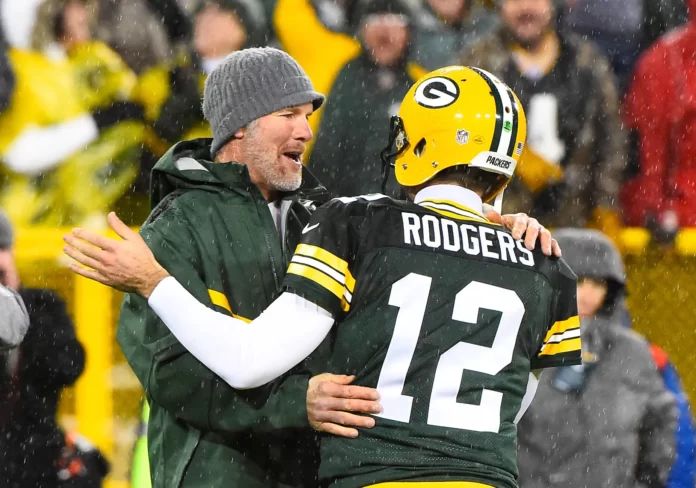Just a few months shy of the 15-year anniversary of the New York Jets trade for Brett Favre, Aaron Rodgers looks to follow in his predecessor’s footsteps. But will history look more favorably upon this iteration of the Jets trading for a Green Bay Packers Hall of Fame QB?
Trading for a 39-year-old quarterback once again is not necessarily the safest move in the world, but with how close the roster appears to be to a legitimate contender, the Jets had to try. Only time will tell. But until then, let’s take a look at some history and why things may be different this time around.
History of the Brett Favre Trade
Green Bay has a rich history at the quarterback position. No other organization can boast 30 years of consistently high-level play the way that the Packers can. However, the on-field heroics have always been accompanied by … high maintenance … personalities at the position.
“All I can say is I’ve always wanted to be a Packer. I think I always will be a Packer. I’m not a traitor. Never will be. It’s business. That’s the way it works.”
That’s what Brett Favre said the day after the trade occurred on Aug. 6, 2008.
But before we look at the trade, we must know how we got there. In 2002, Peter King quoted Favre as saying, “I think about retirement a heck of a lot more than I used to … I miss home.”
Favre, like Rodgers all these years later, never shied away from a good quote to rile up the masses. The two gunslingers share many commonalities, but that may be their greatest one. Favre talked about dreading the return to football facilities for training camp. And from then on, the rumors about Favre’s retirement never ceased.
That leads us to 2005, when California QB Aaron Rodgers unexpectedly fell all the way into the 20s of the NFL draft. The Packers, who held the 24th pick, received a gift from the football gods.
Eighteen years later, Rodgers is a four-time MVP, Super Bowl MVP, and a member of the 2010s Hall of Fame team. Only Tom Brady, Russell Wilson, Patrick Mahomes, and Rodgers have a TD-to-INT ratio of 3:1 or better. Rodgers is 4.52:1. The difference between him and Mahomes (.6) is the difference between seventh-ranked Lamar Jackson and 24th-ranked Andrew Luck.
Drafting Rodgers could be pointed at as the leading cause of the Packers-Favre divorce, but Favre is a big reason why they drafted Rodgers in the first place.
After three years of retirement speculation, a playoff loss to the Vikings caused Favre to ponder his future in the NFL. While he committed to playing in 2005 back in March, the Packers had absolutely no way of knowing how many more seasons the then-36-year-old would keep playing.
Remember, quarterbacks weren’t playing until their 40s as often in the mid-2000s. The Packers drafted Favre’s successor, and that was that.
But Favre was still playing well. In 2007, the Packers went 13-3, and Favre had thrown for more yards than any year dating back to 1998 and more touchdowns than he had since 2004. But with Rodgers heading into his fourth NFL season having only thrown 59 career passes, the organization had made the decision to move on to the 24-year-old QB.
Favre initially retired, emotionally saying, “I know I can play, but I don’t think I want to. It’s been a great career for me, but it’s over.” As we know, it was not over for Favre, but his marriage with Green Bay was.
And after an underwhelming 2008 campaign with a Jets team that effectively went “all in” on a playoff run, it was over. Favre only spent one season in New York, which cost Eric Mangini his job, despite the improvement from 2007.
Why the Aaron Rodgers Trade Could Be Different
There are some eerie similarities between the Rodgers and Favre situations. Both quarterbacks were 39 in their first season with the Jets. Both quarterbacks felt slighted when the Packers drafted a young, toolsy QB in the 20s. Both quarterbacks have openly contemplated retirement, although Rodgers has been on a far-less consistent basis.
While it’s impossible to know for sure if the Jets’ defense will be able to replicate their output from a season ago, their team is in a far different shape than it was when they traded for Favre.
They aren’t spending an extortionate amount of money this offseason on new players. Their defense is young and incredibly talented at all three levels. They have multiple weapons on the offensive side of the ball that have practically been begging Rodgers to come aboard now for some time.
Sauce Gardner, along with Breece Hall and Garrett Wilson, even burned a cheesehead in a ritual on YouTube as an offering to Rodgers. The Jets are young, talented, charismatic, and seemingly only a quarterback away from legitimately contending.
With their offensive line talent and weapons surrounding Rodgers, along with the wonders of modern medicine and Rodgers’ many extra-credit healing methods, there’s no reason to believe his arm and athleticism will fall off a cliff over the course of a single offseason.

